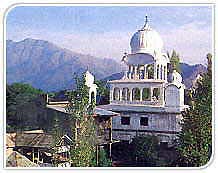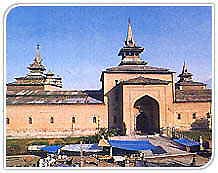 Within
Srinagar, on its highest hill is the Shankaracharya temple, nearly one thousand
feet above the city. It is devoted to lord Shiva. The site dates back to 2500
BC. The philosopher Shankaracharya stayed at this site when he visited Kashmir
ten centuries ago to revive Sanatan Dharma. Before this date, the temple was
known as Gopadri, as an earlier edifice on the same site was built by king GopadUya
in the 6th century. In fact the road below the hill, with residences of high-
ranking State Government officials, is still known as Gupkar road.
Within
Srinagar, on its highest hill is the Shankaracharya temple, nearly one thousand
feet above the city. It is devoted to lord Shiva. The site dates back to 2500
BC. The philosopher Shankaracharya stayed at this site when he visited Kashmir
ten centuries ago to revive Sanatan Dharma. Before this date, the temple was
known as Gopadri, as an earlier edifice on the same site was built by king GopadUya
in the 6th century. In fact the road below the hill, with residences of high-
ranking State Government officials, is still known as Gupkar road. 